---------------------------------------------------------
Niacin (also known at Vitamin B3) is a vital nutrient that ducklings need to grow strong & healthy bones.
Anyone who has raised ducklings knows they grow crazy fast – sometimes it seems to happen right before your eyes. In the first two weeks of life, the average duckling gains 7 times their birth weight!! As a comparison, it takes a human baby 6-7 YEARS to gain 7 times their birth weight (and you thought your human baby grew up too fast!)
This super fast growth rate means they need a super amount of nutrition. Feeding your ducklings a proper diet in the first few months really can determine the quality of the rest of their life.
The ideal feed for ducklings is to find a specific waterfowl or duck starter feed. This should have all the nutrients needed to grow healthy, strong ducks. Waterfowl starter feed can be hard to find because more people raise chickens than ducks and most chick starter feed is marketed as appropriate for all types of poultry. The problem is that ducklings need 2-3 times the amount of niacin that chicks need.
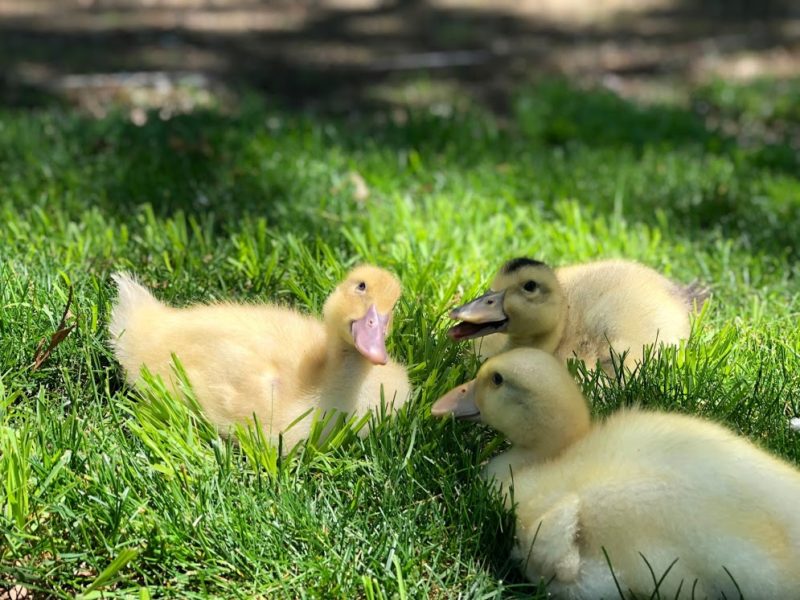
What if my duckling doesn’t get enough niacin?
Niacin is needed for your duckling to grow strong bones and the effects can particularly be seen in their leg strength. In early-stage niacin deficiency, you will notice your duckling is reluctant to walk and move around. They might take a few steps and then plop down to rest. Their legs can appear shaky and they might rock back onto their hocks.
At this stage, the deficiency can still be fixed without any permanent damage. Niacin is not a nutrient that ducks can store in their body so it is necessary for you to provide supplements every day.
The longer the deficiency goes on, the more permanent the damage can be. After a couple of weeks, your duckling will start to have bowed legs and will not want to move about very much, as walking can be painful for them.
Depending on the severity of it, their legs can become so deformed or walking so painful that the duckling can die within just a few weeks because it is too hard for the duckling to move to get food & water.
How to supplement your duckling’s diet
In the wild, mother ducks are constantly foraging for themselves & their babies. They eat a lot of fish, bugs, crustaceans, amphibians, seeds & weedy greens to get plenty of natural sources of niacin. You don’t have to spend the day foraging for your baby ducks though. There are easy-to-use dietary supplements that you can add to your duck’s feed.
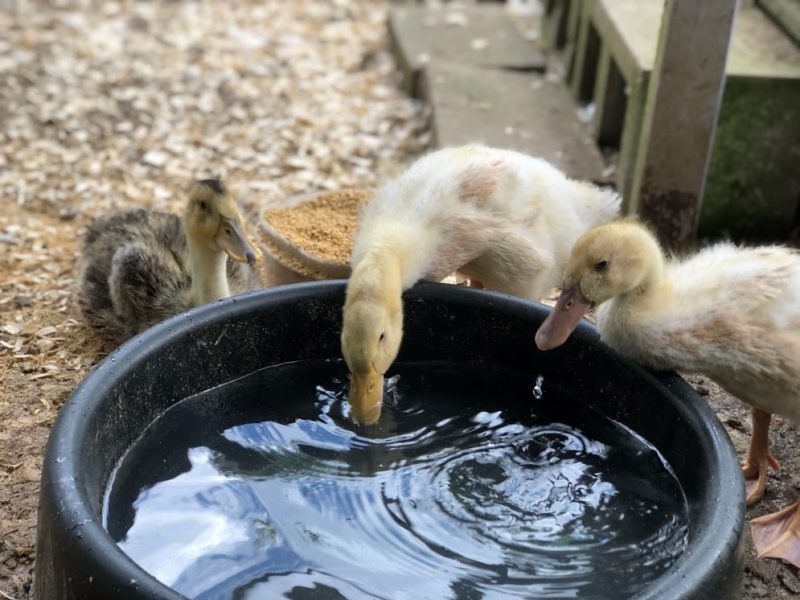
Brewer’s Yeast
This is probably the most used supplement for duck owners for extra niacin. Available widely at health stores, natural food stores, or online, brewer’s yeast is commonly used in bread making and beer brewing. It is often taken by humans as a nutritional supplement good for boosting immune & digestive health. Nursing mothers have also found it helps increase their milk supply.
For your ducklings, you can mix 1.5 tablespoons of brewer’s yeast into each cup of feed. I like to put the brewer’s yeast right on the top of the feed so they will be sure to get some before it all settles to the bottom. You can also try wetting the feed slightly so the powdery yeast will stick to it (just don’t wet too much at a time, you don’t want moldy feed!).
Liquid B3
Niacin (or B3) is water soluble, so you can also buy it in liquid form to mix into your duck’s water. Alternatively, buy vitamin B3 tablets, open them, and sprinkle the contents into the water. You want to try and get about 500 mg of B3 per 4 gallons of water. This can be tricky because ducks waste so much water, it’s hard to know if they are splashing it around or drinking it!
If you have one bird in particular that seems to be struggling, I would get the liquid B3 and administer 10-20 mg daily to that bird to be sure they are getting what they need on top of the general water supplement.
How long do I need to supplement my duckling’s diet?

You will want to continue with the supplements until your ducks are fully grown (around 18 weeks). At this time, your ducks will be getting ready to lay their first egg and you will be switching over to layer feed. Click here to read more about feeding your ducks for life
Adult ducks still require niacin in their diet, but the needs are not as high as when they are fast-growing ducklings. If your ducks have the chance to free range, they will likely get enough niacin by eating tasty bugs all day long.
If your ducks don’t free range at all, you can add special treats of dried mealworms, crickets, peas, sweet potatoes, chicken or turkey meat, fish, and pumpkin. You can also continue to supplement their diet with brewer’s yeast or liquid B3 at about half the amounts you gave them as ducklings.
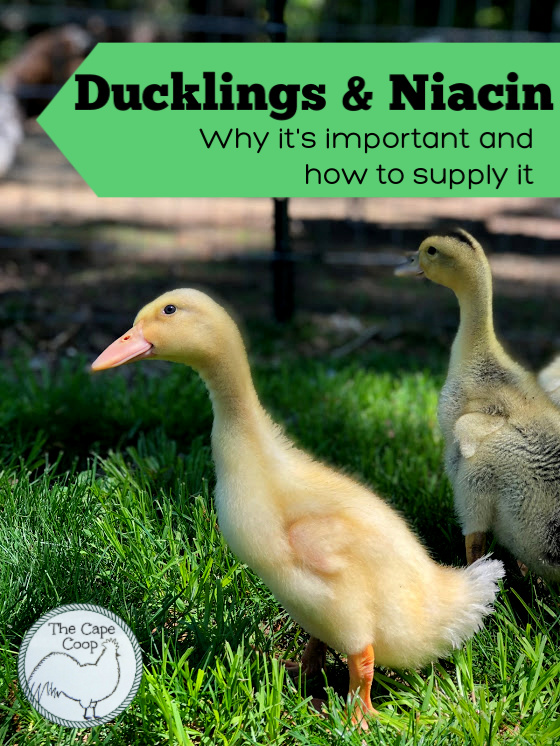
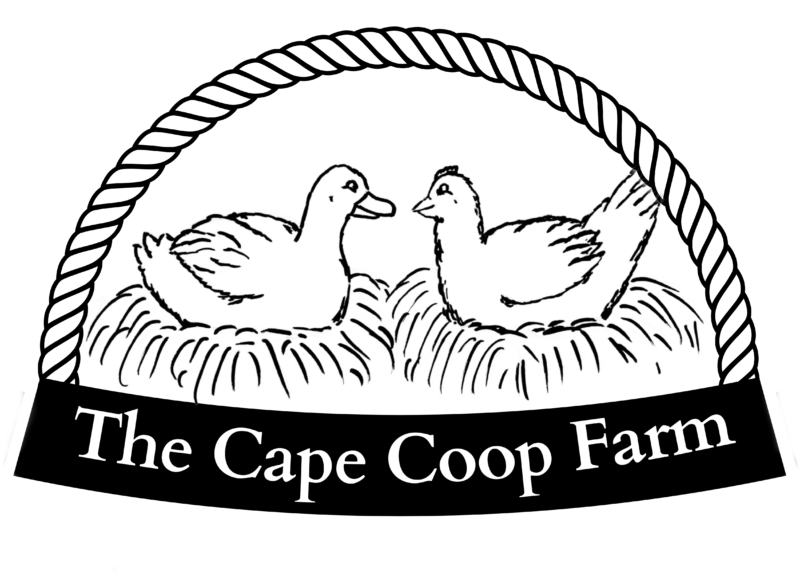
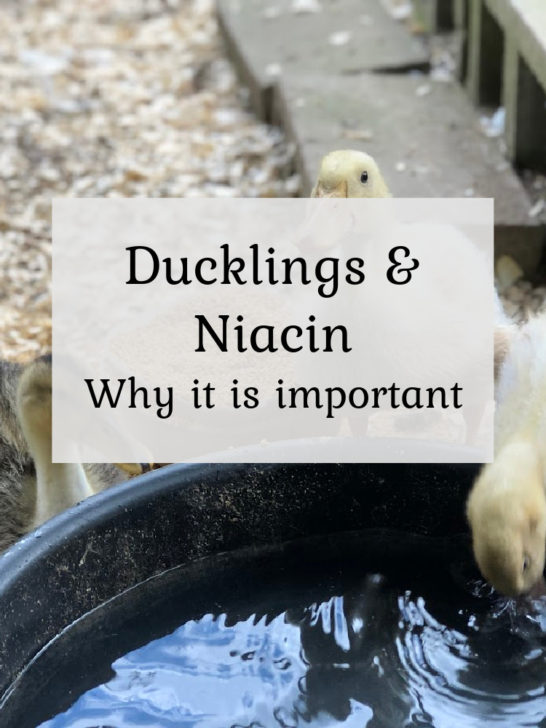

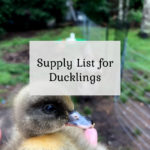
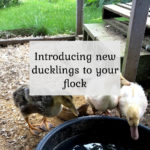

Charlene
Thursday 11th of May 2023
Thank you so much for such detailed and useful information. This is the 2nd "duckling" article I have come across of yours! This is off the topic of niacin, but I was wondering if you have written about how many duck (male and female) do you need for laying eggs? For two or three adults to consume, not sell.
Liz
Wednesday 17th of May 2023
I'm glad you enjoyed the articles! I haven't specifically written about egg consumption, but if you are only wanting ducks for eggs I would honestly suggest that you do not get a male duck. The females will produce eggs without the presence of the male and adding a male sometimes just complicates flock dynamics. Mating can be very rough on the females so if you are going to have a male you should have at least 4-5 females so he can spread around his "affection". Different duck breeds lay at different rates - prolific layers like Pekins or Khaki Campbells will lay 4-6 eggs per week each for at least their first 3-4 years of life. So just three Pekins can give you at least a dozen eggs per week which should be plenty for a couple adults
Alys
Saturday 10th of December 2022
Hello Liz, I have a almost year old call duck boy that has got issues with walking at the moment. It started a few weeks ago when I noticed he was struggling to walk in his outdoor run and sitting down most of the time. I now have him in an indoor run with chippings and hay to walk on. I've checked his legs and feet for any other damage but couldn't find any. Also I've tried giving him Nutri-drops but they haven't had much of an effect. He has still full of life and very tame but just struggles with walking. P.S. I'm from Devon in the UK. Thanks a lot for all your information - its much appreciated as a fellow duck and chicken keeper!!!
Liz
Tuesday 13th of December 2022
Hello! If he is eating typical duck layer feed at 1 year old he should be getting enough niacin from there. Supplementing is really important when they are under 6 months though, so if he wasn't supplemented as a duckling he could just have some lingering issues with weakness for the rest of his life. If he has been totally fine up until now and his diet hasn't changed I would lean more towards an injury, maybe he pulled a muscles or something inside that you can't see. You are doing everything right - keep him safe and try to encourage resting by restricting how far he can explore. Nutri-drops can heal his body as he tries to heal. I had a duck that was born with a leg that never worked quite right, she lived to 7 years old and had a full and happy life, so even if his walking issues never go away, he could certainly still have a great life!
Julie Smith
Thursday 19th of May 2022
I have a 2 month old duckling and have noticed the same thing. I have niacin tablets (500mg). She is in with chick's and refuses to get far from them. They share food and water. They only thing the chick's don't share with the duck are mealworms. Can I sprinkle the crushed niacin on the mealworms? If so how much?
Liz
Wednesday 25th of May 2022
You can, but it might be more effective to just give the duckling niacin drops right into her mouth. That way you can be sure she is getting some
Sherry
Monday 9th of May 2022
I have a two week old Pekin duckling that has been rolling since hatch. Very active tries hard to stand gets a few steps in then falls but not very often. It gets where it wants by tooling and scooting. I’m feeding it duckling feed I bring it out to forge for bugs it swims. I just don’t know what else to do it’s such a fighter.
Liz
Wednesday 11th of May 2022
If the problem has been present since hatching it's most like a birth defect or genetic so I think it's unlikely it will ever walk normally. But as you have seen if it has a strong will it will totally figure it out! It sounds like you are doing a great job caring for her - keep up the duckling feed and I would give some additional niacin just in case (extra won't hurt her, it will just pass through) and the bugs are great for protein. All of which will help build her as strong as possible. Swimming is a great low impact way for her to exercise and build some leg muscles. Keep up the good work!
Keisha
Saturday 15th of May 2021
Hi, my husband recently talked me into bringing home these 2 baby ducks that he found while out fishing last week. They just waddled right up to him and let him pick them up. At first I told him no so he brought them back to where he had first seen them and they followed him half way to his fishing hole before getting tired and wandering into the bushes. On our way back to the car we heard some chirps from the baby ducks. As we got closer these to big yet still baby ducks (no feathers yet) came up to him and chirped til he picked them up. I gave in and said ok mommy bring them home with us. Well neither of us have ever had ducks before. We got dried worms from a friend and have been mixing it with some other food my husband brought home from the store. Everything was fine m besides one was always tripping over it's own feet. Now that same one as of this morning will only take a step or two before laying down. It still eats and drinks on its own. Is this the niacin deficiency? There aren't any animal stores or bird vets in this small town and no way to get the niacin stuff. Is there things around the house or grocery store (small town store) that I can feed the duck to get it better again?
Liz
Sunday 16th of May 2021
It certainly sounds like niacin deficiency. Niacin is a vitamin humans need also (it is vitamin b3) so if you look in your grocery stores vitamin section or at a pharmacy you should be able to find something. You can usually buy a B Vitamin complex in liquid form (so a mix of all the B vitamins). It comes with a dropper doses for humans, but you can use the dropper to give just a drop or two in each birds mouth daily. If it is a well stocked pharmacy they might have brewers yeast, which is what most people use to supplement ducklings. Humans use it as a dietary supplement and nursing mothers often use it to boost milk production. If you can’t find either of those, peas are a great natural source of niacin or tuna (find one packed in water)